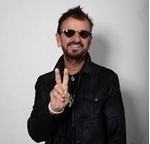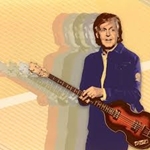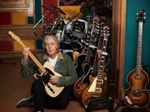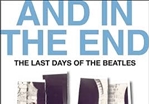- Register
- Log in to Tune-In
- Wishlist (0)
-
Shopping cart
(0)
You have no items in your shopping cart.
Beatles News

The Beatles broke up 50 years ago and since then we’ve lost both John Lennon and George Harrison. Nevertheless, Sir Paul McCartney and Sir Ringo Starr remain good friends and occasionally feature in each other’s music or live shows for Beatles reunions. Most recently Sir Paul sang in the video for Sir Ringo’s new single Here’s To The Nights.
While last year, Sir Ringo joined Sir Paul on stage of the Dodger Stadium for the last night of his solo tour.
The two surviving Beatles performed Helter Skelter for the Los Angeles crowd.
And as Sir Ringo releases a new single, Sir Paul has put out his McCartney III solo album.
Speaking with Rolling Stone, The Beatles drummer said: “He does [have a new record out], yeah — he’s playing everything."
Source:George Simpson/express.co.uk
details
Pop’s biggest sensations, The Beatles, were driven apart by business issues, Lennon’s obsession with Yoko Ono and what one observer called “hostile lethargy.” Or so the story goes.
A new film is lifting the lid on The Beatles' break-up
But maybe their final year-and-a-half together wasn’t quite as acrimonious as we’ve been led to believe.
Maybe there’s a different picture emerging . . . of goofing around in the studio, scintillating performance and gallows humour.
Maybe being in a giant goldfish bowl didn’t quite descend into the Fab Four’s total desperation to get away from it all and each other.
Yesterday, film-maker Peter Jackson, best known for the Lord Of The Rings trilogy and First World War documentary They Shall Not Grow Old, offered us a “sneak preview” of his latest project.
Source: Simon Cosyns/the-sun.com
details
Paul McCartney got candid during his most recent interview with CBS Sunday Morning on Sunday (December 20).
The iconic singer-songwriter addressed many matters during the eleven-minute segment, including whether or not The Beatles would have ever reunited, his latest album McCartney III and his experience of recording a project during quarantine amid the global spread of COVID-19.
The most noteworthy aspects of the expansive interview included John Lennon and a potential reunion between the members of (debatably) one of the most influential musical groups of all time.
Though it’s been forty years since Lennon was shot and killed in the archway of the Dakota, McCartney admits he’s unsure whether or not the quartet would have ever gotten back together again.
"He was showing no signs of slowing up. You know, he was still making great music,” he said of his band member Lennon. "The question is: Would we have ever got back together again? I don't know. We don't know."
Source: Forbes
details
“The Lord Of The Rings” filmmaker Peter Jackson has revealed footage of his much anticipated Beatles documentary, “The Beatles: Get Back.”
The film was supposed to be released in September, but was postponed to 2021 because of COVID-19.
Introducing the film from his editing room, Jackson said: “This film was due to be finished around about now, but like the rest of the world, has been affected by the COVID pandemic. And so the only good thing really is that we are in the movie in New Zealand and now that our country has largely stamped out the virus, we were able to come back into the cutting room and carry on with the editing that we’re doing.”
Jackson said the film had access to 56 hours of never-been-seen footage of the band. “And it’s really great stuff,” declared Jackson. “I would say we’re about halfway through the edit now, but because you’ve been so patient and the film has been delayed until 2021, we thought it was a good time to give you a little sneaky preview of what we’ve been working on and the sort of vibe and the energy that the film is going to have.”
Source: Naman Ramachandran/variety.com details

Ringo Starr has released the video for the terrific new song, “Here’s to the Nights” that was originally released on December 16. The song of peace, love and friendship was written by Diane Warren, and is the best thing he’s done in years. It features his friends, some longtime and some new, including Paul McCartney, Joe Walsh, Corinne Bailey Rae, Eric Burdon, Sheryl Crow, FINNEAS, Dave Grohl, Ben Harper, Lenny Kravitz, Jenny Lewis, Steve Lukather, Chris Stapleton and Yola.
The video arrived on December 18, the same day McCartney’s much-anticipated McCartney III was released.
Source: bestclassicbands.com
details

Paul McCartney is a people person. He initially resisted the Beatles’ permanent retreat to the studio, and on the eve of the band’s breakup, suggested they return to the road. (He had to settle for the roof.) In the decades since then, he’s rarely stayed off the stage for extended stretches. In recent years, he’s only picked up the pace, touring eight times (and totaling 310 shows) in the decade preceding the end of the “Freshen Up” odyssey that was supposed to extend into this year. His serial monogamy extends to his band too: His current touring (and sometimes recording) group, a four-person unit that coalesced in 2002, has lasted nearly as long as the Beatles and Wings combined. (One of its members has been by his side since 1989.) McCartney is constantly sighted on buses and subways. He goes on talk shows, calls into radio programs, and sits for features in magazines, obligingly “revealing” time after time that he sometimes dreams of John and George.
Source: Ben Lindbergh/theringer.com
details
Sean Lennon has come to Twitter to defend his mother, Yoko Ono, and to counter what he sees as the wrong idea about his late dad, John Lennon.
Sean is such a lovely guy, and I don’t blame him for putting the record straight. He also calls Paul McCartney’s “McCartney III” an instant classic.
Most importantly he says of his parents: “I’ve never seen two people have more love and respect for each other than my parents.”
It’s 2020, I can’t believe anyone is questioning John and Yoko’s love. They were human beings, they separated at one point. John had a relationship with May Pang. But Yoko deserves our respect. She’s also 87, and frail. Sean also deserves our respect as he cares for her.
Source: Showbiz 411
details
Paul McCartney admits he despised being labeled "the cute one" during the Beatles era.
"I hated that," McCartney told SiriusXM's The Howard Stern Show, agreeing that the term distracted from his musicianship. "That's what happens — just, 'He's the cute one.' I'd go, 'No, I'm not! Don't call me that. I hate that! But once it's said, it kind of sticks."
Noting the various media nicknames bestowed upon the four Beatles, McCartney continued: "They had to just say, 'He's the cute one; he's the quiet one [George Harrison]; he's the witty one [John Lennon]; and he's the drummer [Ringo Starr]." The singer added playfully, "I just can't help being cute, Howard."
McCartney previously expressed his discomfort with the "cute" label in a 1989 New York Daily News interview. "I've never really thought I was 'cute,' though I guess some people think so," McCartney said. "Maybe there were a few moments of cute, mostly in the early days. As you get older, the harder edges come out. I don't think 'Fool on the Hill' is a cute song. 'The Long and Winding Road' isn't cute. 'Yesterday' isn't cute. 'I'm not half the man I used to be' — that's pretty strong, and remember, I wrote it when I was 24."
Source: ultima details

The Beatles legend was set to headline the festival in 2020, but isn't sure if it can go ahead as planned next year.
Paul McCartney isn't sure if Glastonbury Festival can take place in 2021 due to the coronavirus pandemic.
The legendary Beatles star was due to headline the festival in 2020 and has shared his hopes for getting out on the road again.
However, though he's marvelled at the ways performers and artists have worked around restrictions with live streamed performances and socially distanced gigs, the legend isn't sure something as large as Glastonbury could take place.
"People have started to find ways with Zoom and with socially distanced things,' he told The Sun. "But for a thing like Glastonbury where you’ve got over 100,000 people packed into a field, that’s a super-spreader you know."
This year, the Pyramid Stage was set to be headlined by McCartney and first time festival performers Taylor Swift and Kendrick Lamar.
Source: radiox.co.uk
details
Back in 1970, as the book was closing on The Beatles' time together, Paul McCartney came out with a release that established him as an artist in his own right — and a versatile one, who played every instrument on the album simply titled McCartney. In 1980, he followed it up with McCartney II — another kind of do-it-yourself solo album, released as another band of his, Wings, was breaking up. Now, after another 40 years, the artist has been quite busy in quarantine.
"I was very lucky to be able to come to my studio and make some music, which took the edge off the whole quarantine thing. I would write a song, then I'd come in and record it — or I'd say, 'Wait a minute, what about that song I started last year but never got round to finishing?' So there was no worry attached," he says. "If you're making an album, what you might call a proper album, you're concentrating on making sure it's right. And this project, I wasn't concentrating. I was just [saying], 'Sounded good? Right, on to the next thing.' It's got a very loose feel to it."
Source: Mary Louise Kelly Twitter Dave Blanchard/npr.org

Paul McCartney recently named his all-time top three drummers — and he showed some love for his former Beatles bandmate.
"I'd go Ringo [Starr] top — he's something else," he told SiriusXM's The Howard Stern Show. "Second, I'd go Bonzo [Led Zeppelin's John Bonham]. And third, [the Who's] Keith Moon. That's mine. I'm going from that generation. Those are pretty good drummers, those boys."
You can watch the clip below.
Host Stern opened that conversation by recalling a recent on-air chat about the greatest rock drummers. That unspecified roundtable included his own pick for Bonham and someone else's selection of Rush's Neil Peart.
Elsewhere in the Stern interview, McCartney reflected on John Lennon's insecurities and the formation of their first band, the Quarrymen.
Source: ultimateclassicrock.com
details
Ringo Starr is releasing a new album, titled "Zoom In," featuring contributions from Paul McCartney, Dave Grohl and Finneas.

Bob Dylan kicked off December by quietly releasing Bob Dylan — 1970 (50th Anniversary Collection) through the U.K. store Badlands. Now, he’s releasing it digitally on February 26th, 2021 via Columbia Records/Legacy Recordings.
Bob Dylan — 1970 will be released as an eight-panel digipack with new cover art and liner notes by Michael Simmons. The recordings span from March to August 1970, including rare sessions with George Harrison that have been widely bootlegged for years. They jam on “Time Passes Slowly,” “Mama You Been on My Mind,” the Beatles’ “Yesterday,” and others. You can preorder it now.
Dylan initially dropped Bob Dylan — 1970 as part of the 50th Anniversary Collection copyright extension series, in response to a European law stating that recordings enter the public domain 50 years after their creation if they aren’t officially released by the copyright holder. Badlands limited the copies to one per customer; one is currently on sale at Discogs for more than $1,000.
Source: Angie Martoccio/rollingstone.com

Ringo Starr might have just turned 80, but he can’t be accused of taking it easy. The Beatle drummer kept busy making music this year, even though it was the first time in years he couldn’t hit the road with his long-running All-Starr Band. His new single, “Here’s to the Nights,” is a quintessential Ringo ode to peace and love, just in time to sing out the end of a 2020 where everybody had a hard year. He got a little help from his friends for “Here’s to the Nights.” The song has long-distance vocals from pals like Dave Grohl, Lenny Kravitz, Sheryl Crow, Chris Stapleton, Ben Harper, Ringo’s brother-in-law Joe Walsh, and many more — including a promising British bass player named Paul McCartney.
Ringo worked in his home studio on a five-track EP set for March, with the timely title Zoom In. For one of rock & roll’s most beloved figures — and one of its most gregarious legends — it was a challenge to adapt to making music in the age of social distancing. But as he always warned us, it don’t come easy. “Here’s to the Nights” is a wry sing-along with lyrics from Diane Warren. As Ringo says, “New Year’s Eve, details

Who or what REALLY broke up the Beatles? Ken McNab’s book “And In The End: The Last Days of the Beatles” hardly provides a definitive answer to that question and is all the better for it.
Of course, there is no single reason the band dissolved, although individuals have long pointed to the death of band manager Brian Epstein, John Lennon’s marriage to Yoko Ono or Paul McCartney’s attempts to steer the band’s creative ship with the “Get Back” project as THE cause. Those all come into play as McNab details, month by month, the lives of all four Beatles in 1969. But so much more is also at work, from the band’s Apple Corps becoming more of a financial boondoggle than creative hub, to factions warring over who should represent the group’s business interests, to all four Fabs finding creative outlets and music-making opportunities outside their unit.
Source: John Young /post-gazette.com
details